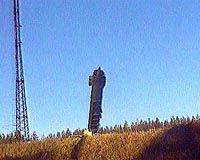| . |  |
. |
Washington (AFP) Oct 9, 2009 With a surprise Nobel Peace Prize in hand, President Barack Obama came under pressure Friday to make strides in his quest to rid the world of nuclear weapons, a goal experts said would be slow in coming. "It's a long-term goal and a long voyage over a pretty big ocean of nuclear disarmament," former United Nations nuclear weapons inspector David Albright told AFP. Obama is "trying to turn a big ship so it can become an important part of US policy," he added. The Nobel committee emphasized Obama's efforts to bring proliferation and disarmament to the top of the global agenda in a stunning decision to award him the coveted prize less than nine months after he took office. Albright said an important "test" of that effort would be ratification of the Comprehensive Nuclear Test Ban Treaty (CTBT) or the Fissile Material Cut-off Treaty. But Obama may lack the necessary votes in the US Senate. Just two weeks before receiving the award, Obama chaired an unprecedented UN Security Council summit to rally world support for nuclear non-proliferation and disarmament. The president is hoping to make gains by inking a new nuclear arms reduction pact with Russia to replace a treaty that expires in December. "We must now intensify our efforts to eliminate these unusable weapons," urged Physicians for Social Responsibility executive director Peter Wilk. "We are only at the beginning of the real work needed to make this vision a reality." Obama has unilaterally scrapped controversial US plans to deploy missile interceptors and a radar in eastern Europe that Moscow had vehemently opposed. Washington and Moscow have agreed to seek deeper cuts in their nuclear arsenals in a follow-on to the Strategic Arms Reduction Treaty (START), the first tangible benefit from Obama's efforts to "reset" relations with Russia. Signed in 1991 just before the break-up of the Soviet Union, START has become the administration's top arms control priority as it faces growing challenges on many other policy fronts. The Obama administration also hopes the prize will help its effort to wean Tehran and Pyongyang from their controversial nuclear drives. "For all the kinds of political problems it could cause here in the US, it could give him more clout on Iran and North Korea," said Princeton University professor of history and public affairs Julian Zelizer. But in his push to rid the world of nuclear weapons -- a goal Obama acknowledged will likely not be achieved during his term or his lifetime -- he still has to worry about a nuclear arms race exploding in the Middle East if Tehran makes substantial progress on its program. Key US allies Egypt, Jordan, Saudi Arabia and Turkey have hinted they may seek to develop nuclear weapons to bolster their defenses against Iran as it gains clout in the Middle East. Western governments and Israel, largely considered to be the Middle East's sole, albeit undeclared, nuclear power, have accused the Islamic republic of trying to develop atomic weapons under the cover of its civilian program, a charge Tehran denies. And North Korea has continued to defy international pressure, conducting an underground nuclear test and launching missiles this year as it ratchets up a tense stand-off on its nuclear program. But if Washington fails to ratify the CTBT, Obama may face enormous difficulties in convincing the rest of the world to freeze their nuclear weapons programs. Sentiment on that front will be tested when the president hosts global leaders for a nuclear security summit in March. Drawn up in 1996, the treaty has been signed by 181 countries and ratified by 149. But it needs the approval of nine others, including China and the United States, before coming into force. The prize also came as the 48-year-old president has yet to deliver on any of the key foreign policy issues that top his agenda, such as closing Guantanamo Bay, restarting the Middle East peace process, ending the war in Iraq and improving the security situation in war-torn Afghanistan. Obama's Nobel win "is really based on the promise of what he can do... rather than on any concrete achievements," noted Zelizer. "When you raise expectations, deflating them can be devastating." Share This Article With Planet Earth
Related Links Learn about nuclear weapons doctrine and defense at SpaceWar.com Learn about missile defense at SpaceWar.com All about missiles at SpaceWar.com Learn about the Superpowers of the 21st Century at SpaceWar.com
 Russia plans shift in nuclear arms doctrine: reports
Russia plans shift in nuclear arms doctrine: reportsMoscow (AFP) Oct 8, 2009 Russia will shift its policy on the "preventive" use of nuclear arms in the next version of its main military strategy document, a top Russian security official was quoted as saying Thursday. "Changes in the positions on the option of carrying out preventive nuclear strikes will go into the new military doctrine," said Nikolai Patrushev, the secretary of the national security council, Russia ... read more |
|
| The content herein, unless otherwise known to be public domain, are Copyright 1995-2009 - SpaceDaily. AFP and UPI Wire Stories are copyright Agence France-Presse and United Press International. ESA Portal Reports are copyright European Space Agency. All NASA sourced material is public domain. Additional copyrights may apply in whole or part to other bona fide parties. Advertising does not imply endorsement,agreement or approval of any opinions, statements or information provided by SpaceDaily on any Web page published or hosted by SpaceDaily. Privacy Statement |